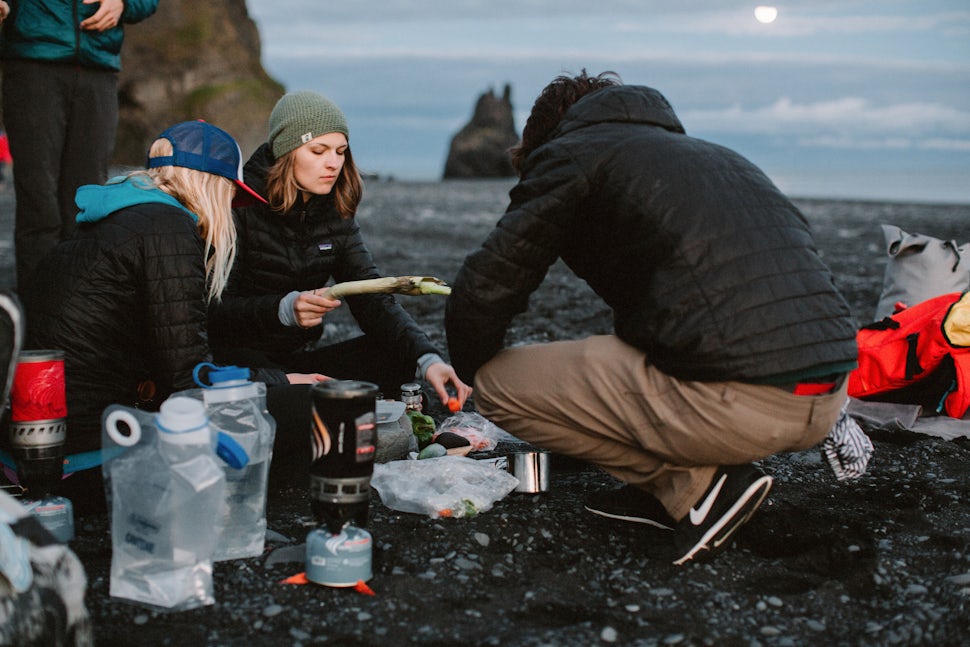7 Tips For Mastering Your Backcountry Kitchen
A little effort, a little thought, and a little love will turn your MSR stove into a five star kitchen.

It can be easy to let the kitchen sink to the bottom of your backpacking planning list - it’s just fuel, right? Balance lightweight with high calories and you’re good to go. This is true, but a good meal can really lift your spirits if you’re having a tough day in the backcountry and a botched dinner can spoil a great one.
Just imagine sitting under those beautiful blue skies surrounded by a crown of mountains, finding solace with the purity of nature, and eating a delicious meal cooked in harmony with the woods. Sound epic? That’s because it is. These 7 tips will help you cook - and more importantly, eat - to your heart’s content on your next backpacking trip.

1. No More Cold Leftovers
Don’t cook or carry more than you can eat. Especially oatmeal. For some reason, there is always too much oatmeal. Now you’re stuck carrying solidified grey mush that you either force feed yourself or carry out. A good rule of thumb to follow...over pack snacks, not meals.
2. Get That Food Naked Before Hitting The Trail
Those wrappers and bags might be colorful and interesting nutrition reads if you get that bored in the woods (if so we have other problems to talk about), but cold hands don’t like tearing packages open. Don’t spend five minutes trying to just open dinner while hangry cold compatriots glare at you. Plus, even if you are careful, you’re pretty much guaranteed to litter micro-trash into nature, also not cool. So instead, re-bag all your food into Ziplocs or produce bags (which you can wash and reuse :)
3. Know Your Stove Like The Back Of Your Hand
That time I spent two days sleeping on a snowy desert mesa without a working stove – the gas hose simply popped out of the pump into the fuel bottle – wouldn’t have happened had I understood my stove better. Experiential learning is great but don’t take that risk with something as necessary as hot food and drinks. Test your stove before you leave, memorize its parts, and test cook with it. Peanut butter sandwiches and trail mix will do if you get stuck...but how much better is a hot meal after a long day of hiking? Indescribably better.


4. Respect The Kitchen
You’re exhausted after an unexpected turn became a bushwhacking adventure that barely landed you at camp before dark: take a breath and treat your kitchen with the respect it deserves. A carelessly set up cooking area – one that is not flat – will serve dinner to the ground. I’m all about getting myself dirty in the backcountry, but dirt and pasta don’t mix well. Even worse than toppling dinner over, you’ll probably knock boiling water onto a foot or hand. Burns land as one of the most common backcountry injuries. They force early ends to trips – it’s hard to care for burns in the woods, and you simply cannot stick a blistered foot into a leather boot. Take the time to set up your kitchen and don’t risk dirty food or a trip cut short.
5. Wash Your Damn Hands
Gastrointestinal infections are the most common backcountry illness but also one of the most preventable. Wash your hands before you touch food, cook food, eat food, serve food, or even go within 10 feet of the kitchen. Suds up with water and soap – hand sanitizer doesn’t get rid of the poop particles that hang on. Don’t be responsible for every one of your friends dropping like stones, furiously digging cat holes. Trust me, they aren’t enjoying the trip. They probably regret ever coming, ever meeting you, and ever being born. So everyone, just please wash your hands.


6. Know Your Place
If you’re going into the wilderness, there will probably be animals. We stomp through their home, so research how to exist with the creatures that live in the wilderness you decide to explore. Take the precautions to keep you and the animals safe. Bear hangs or a bear canisters if you dive into the Rocky Mountains or sleeping with your food in the Himalaya’s to keep stray dogs from stealing your bagels. Make sure to keep your food closed at all times. Rodents and birds pride themselves on being able to devour all of your granola in an hour. Even if you catch them in the act you probably shouldn’t eat that food they’ve touched, so do all you can to prevent it from happening.
7. Do It for the Trees
Take the time to research the LNT principles for the environment you adventure into. It is easy to quickly dump small food crumbs onto the ground instead of taking the time to put them in a trash bag, but this attracts animals to your camp and damages the environment. Carry your leftover food out. Don’t stuff it into a cat hole. Wash your dishes, actually everything, 200 feet away from the water source. Don’t make those poor fish deal with your nasty soap and food, they already have a hard enough time with the dams.

We want to acknowledge and thank the past, present, and future generations of all Native Nations and Indigenous Peoples whose ancestral lands we travel, explore, and play on. Always practice Leave No Trace ethics on your adventures and follow local regulations. Please explore responsibly!
Do you love the outdoors?
Yep, us too. That's why we send you the best local adventures, stories, and expert advice, right to your inbox.








